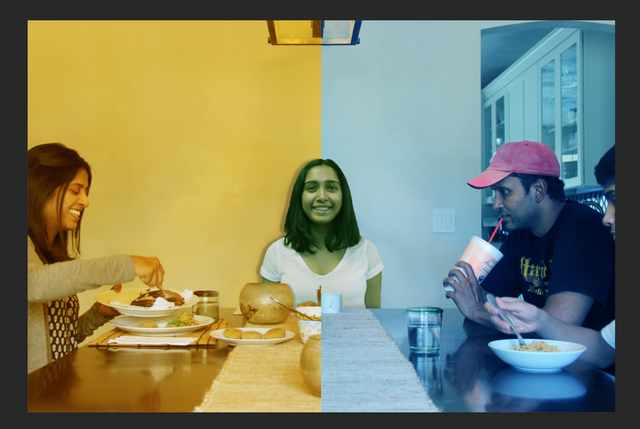Being raised a collectivist in an individualistic society
How two contradictory ideas can create harmony
Staff writer Fiona Koshy shares her experiences living amongst both individualistic and collectivistic cultures. While both have their ups and downs, she finds that balancing the two has shaped who she is as a person.
April 4, 2017
When I was young, I remember coming back from vacation one summer to be greeted by neighbors playing in our backyard. As my family pulled into the driveway, the sight of volleyballs flying through the air and sounds of laughter welcomed us home.
Excited, I dropped my suitcases and sprinted to the backyard to get in on the fun.
To some, it may have been alarming coming back from a trip to see neighbors using your property, unannounced, but to us, this was normal.
Both my parents grew up in what would be classified as collectivistic homes. My dad was raised in Brunei in southeast Asia, and my mom was raised in Wisconsin by parents who had just moved to America from India.
Despite their differences, both Brunei and India are collectivist countries.
Collectivism within a culture places emphasis on the needs of a group as a whole, rather than members of that group.
Whether it is our inclination to share food rather than order separate plates or keep our door open to family and friends for as long as they need, there are so many small ways that collectivism has shaped my life.
My upbringing has taught me to truly care for others. I do not get nearly as caught up in small problems because I remember to take a step back and look at the big picture.
Placing value on community is one of the most important aspects of my life. Everyone I care for is treated like family which has allowed me to cultivate meaningful relationships.
Having lived my whole life in America, however, my collectivistic upbringing has been equally matched by an individualistic environment.
Individualism is the idea of leading life as an individual with one’s own actions, intent and goals in mind.
Rather than limit myself to the credentials or stipulations of a group, I have learned to view myself as my own being. This mindset has led me to discover so many of my own unique interests and traits.
I have learned to grow into my own person, shaping my life to fit my own mold rather than that of others.
Running, writing and taking pictures are hobbies that play a huge role in my life, yet no community has had to force these interests onto me. By separating myself from others from time to time, I see that there are distinctions within a group.
Moreover, seeing myself as my own individual has given me accountability for my actions. My own mistakes and blunders are not reflective of those I associate myself with. And if I want to reach my goals, I have to put in the hard work myself rather than expect others to do part of the heavy lifting.
There are times, however, when these ideas are so different that they present a crossroads.
When I am presented with plans that I consider to be more favorable than previous commitments, my environment tells me to cancel my initial plans and attend what I want to, but my upbringing reminds me to honor my commitments no matter the sacrifice.
At the same time, I have learned that taking time for myself is just as important as taking time to be with others.
Finding a balance between these two contradictory forces has opened me up to all sorts of experiences and ultimately, has shaped me into the person I am today.
Follow Fiona on Twitter @fionakoshy10












Meha Srivastav • Apr 4, 2017 at 7:04 pm
this is a cool story, Fiona! really true 🙂
Farah Merchant • Apr 4, 2017 at 6:26 pm
Wow, this is an amazing story. Both my parents grew up in a collectivist society, and I used to account the two contradictory ideas as negative. However, you have put an amazing positive spin on it. Nice job!